Keyword research is one of the most important parts of SEO, particularly today when so many brands rely on content for traffic. Unfortunately there are a ton of companies, content marketers and bloggers that don't do a lick of keyword research and miss out on a ton of potential traffic as a result. Then there's the sites that don't have a blog at all.
One of the key reasons these sites don't do keyword research or don't have a blog is because they aren't sure how to get started. Either that or they just aren't making it a priority. But instead of just talking about the benefits of keyword research and blogging, I thought of a much better (and cooler) way to help anyone struggling to come up with keywords or content topics.
I'm starting a new series of blog posts where I'll:
- Find companies that either don't have a blog, or aren't making the most out the one they have.
- Do some keyword research to identify some target keywords for them.
- Come up with a month's worth of blog topics for them, based on the keywords I find.
These "case studies" will be helpful in a few different ways.
- If the companies I'm using as examples want, they're free to steal the exact keywords and strategy I write map out.
- You'll get to see step-by-step how to find keywords and come up with topics for your own blog.
- It'll be a good break from the generic "this is why you need keyword research" articles that have all been done before.
- It gives companies one less excuse for not blogging.
Quick Notes
Right now this is just a test. If you all like them and I can continue to make them valuable, I'll do more.
Also, I'm not affiliated with any of the companies I'll be doing this for. Most of the first ones are companies I'm a customer of, or ones I think could really benefit from having a blog.
The keyword research and blog topics I outline are based solely on my own research of the companies, and assumptions on who their target audience is. Ideally I'd be able to ask each company questions to get a better idea of who they're trying to reach, but that would make this process way too long. Plus, this is primarily to show you all how to perform basic keyword research and put together a strategy/plan for your blog.
Lastly, these are just suggestions. There's always more than one approach to take, so keep that in mind.
The Tools
In order to keep things simple, I'm going to be using two main tools:
- KWFinder: My keyword research tool of choice, and a great alternative to Google Keyword Planner after they stopped displaying search volume numbers to non-advertisers. Check out my KWFinder review here.
- Google Sheets: I'm going to make a spreadsheet to outline the blog topics and posting schedule.
These are the only two tools you "need" to get started. KWFinder is extremely affordable and Google Sheets is free.
If you want, you could also use a ranking tracker to track your keyword rankings. I use SEOProfiler because it has a ton of other SEO features that are awesome. But if you just want a low-cost ranking checker, Wincher is another good option. I think it's still less than $10/month.
Now that that's out of the way, let's jump into the good stuff. As you probably guessed from the title of this post, the first company on my list is Invoicely.
About Invoicely
Invoicely is a very awesome SaaS company that lets businesses create invoices. Judging by their pricing and messaging on their website, they're primarily targeting entrepreneurs, startups, small business owners and freelancers.

These are people who don't need enterprise level invoicing, and are probably working with smaller budgets.
As far as I've been able to tell, Invoicely doesn't have a blog at all, which will give me a lot of room for content ideas and keywords. Plus, I'm an Invoicely user so I have a pretty good feel for the type of content their audience could benefit from.
Blogging Plan Overview for Invoicely
Based off Invoicely's audience and their product, I'd suggest they blog about these types of topics:
- Tips for invoicing
- Client management
- Business management
- Freelancing advice
- Self employment
I want to focus on keywords that are problem/solution oriented. So a lot of how-to style posts and listicles like "X Ways to ..." These types of articles perform well in search and pull in a ton of long tail traffic, which is very helpful for a new blog.
Another thing to keep in mind when coming up with content ideas for a SaaS or Ecommerce company is to think of blog topics that give you an opportunity to mention the product you're selling. So for Invoicely, I'll be sure to have topics where they could naturally mention their product without being spammy.
What Makes a "Good" Keyword?
Before I start searching for keywords, I think it's important to set some ground rules for which keywords to choose. In other words, what qualifies as a "good" keyword?
Everyone doesn't use the same criteria for which keywords they'll target. But here are some of the things I look at:
- Is it relevant to my audience?
- Are there other articles ranking in the top 10? As opposed to a bunch of marketing or business pages.
- Will it make a good article?
- What's the search intent behind the keyword?
- Is my site already ranking for this keyword?
My favorite keywords are ones that can be tied to a direct problem. For instance, I'd rather target "bleeding gums" than just "gums." These keywords attract people who are further along in the buying process.
Now, let's start doing some research to find keywords for Invoicely.
Keyword Research for Invoicely
The first step I like to take is to brainstorm keywords I think would be good. Think of keywords people in your industry or niche would search for. These will form the basis of your "seed keywords." Seed keywords are simply the keywords you'll plug into KWFinder to get a list of more keyword ideas.
I also do some competitive research. By competitive research, I mean looking through the websites of my competitors to see what they're writing about. This can be a great source of ideas, especially when you're starting from scratch.
Here are some of the blogs of Invoicely's competitors that I looked at.
- https://www.freshbooks.com/blog/
- http://blog.invoiceberry.com/
- https://due.com/blog/
- http://quickbooks.intuit.com/blog/
With your seed keywords ready, it's time to head over to KWFinder.
We'll use "invoicing" to get started. I set a filter to only include keywords at least three words long. This stops the results from being too broad.
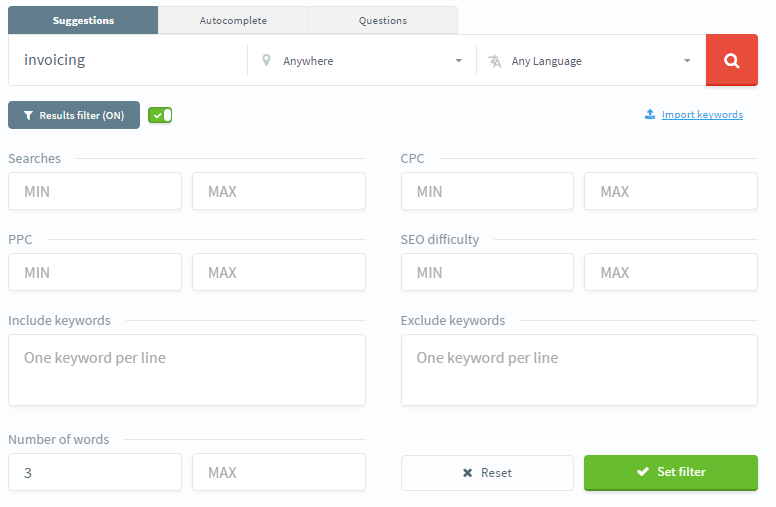
I got a lot of results from this search, but most of them were keywords related to templates and variations of each other. Invoicely could potentially make a series of template posts to target those keywords, but for now let's focus on keywords we can create longer evergreen pieces of content for.
To narrow down my list some more, I added an exclusion filter to exclude any results that contained the word "template."
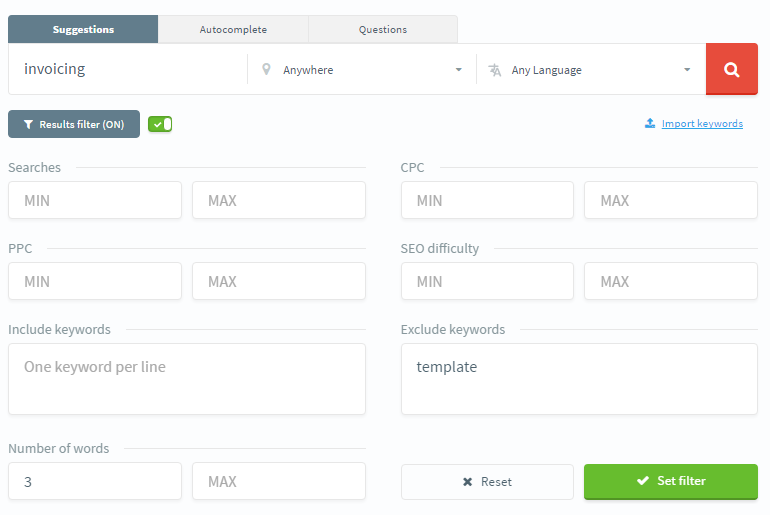
After going through the list, here are some of the keywords I decided on. I'm using the list feature in KWFinder to organize any good keywords I find through my searches.
- create an invoice
- invoice for payment
- writing an invoice
Since I didn't get a ton of results, my next step was to use the "Questions" search feature of KWFinder. This is great for identifying long tail keywords that are problem/solution oriented. The queries KWFinder shows are questions people are actually asking so it's a gold mine for content ideas.
You'll notice the search volume is very low for them, but don't get tied down to that. The search volume numbers are based on the exact phrase you see, but there are a ton of different ways people could search for the same question.
Focus on the actual questions. If it seems like something that a lot of people would search for, and targets a distinct problem/challenge your audience has, I say go for it.
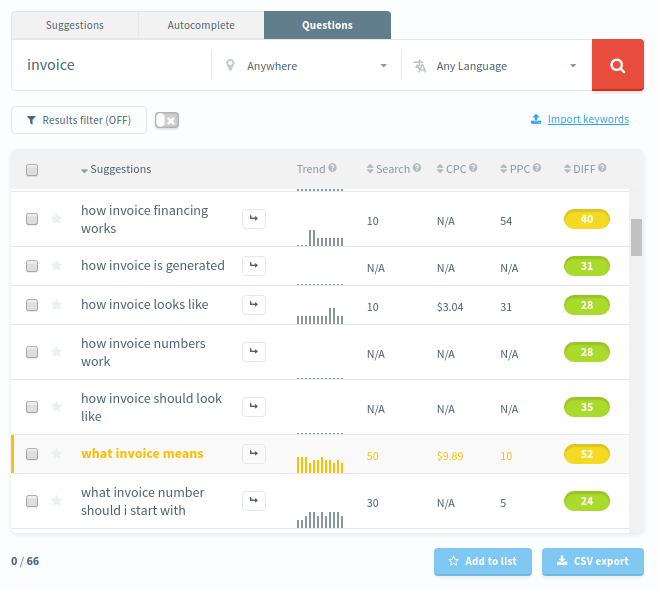
Another sign a keyword is a good target is when there are multiple articles ranking on the first page for it. For instance, one of the keywords I found was "who signs invoice". KWFinder reports that there's no search volume for it, but I thought the topic was interesting. So I clicked on the keyword to get an analysis of the sites ranking for it.
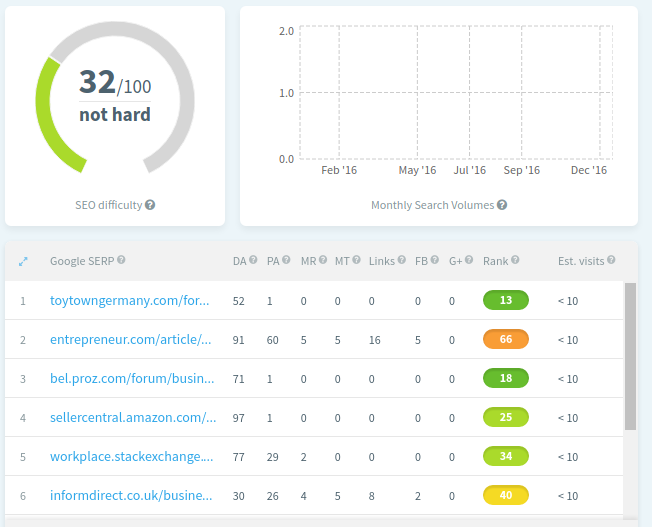
It looks like a lot of people have questions about signing invoices. Even Entrepreneur.com has an article on the topic. So I'll add it to the list.
We've gone over the suggestions and questions search features of KWFinder. The last one is autocomplete.
With this search feature, you plug in your seed keyword and KWFinder pulls results using the autocomplete feature search engines have. In other words, the suggested queries Google recommends as you start Googling something.
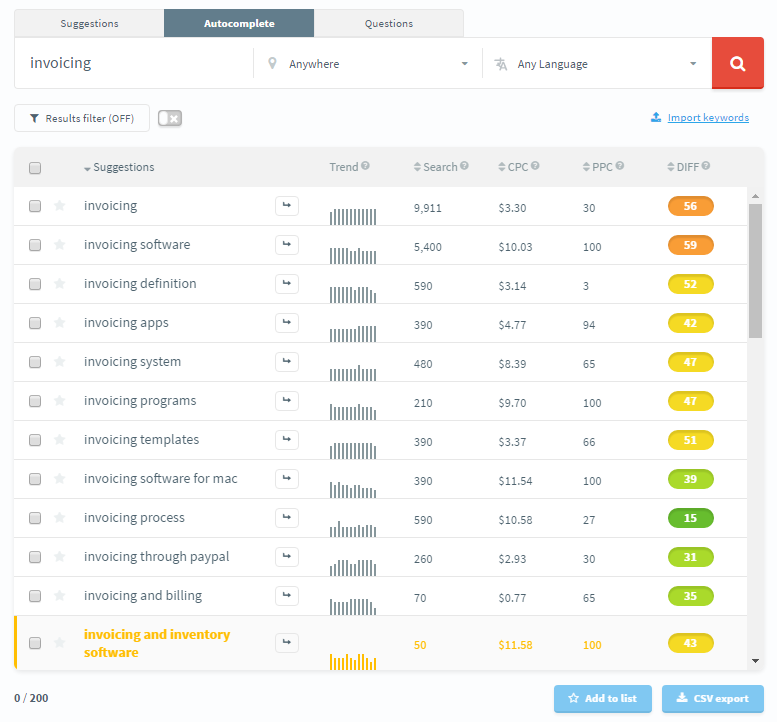
At this point, I have a good deal of keywords related to invoicing. Here's what my list looks like so far.
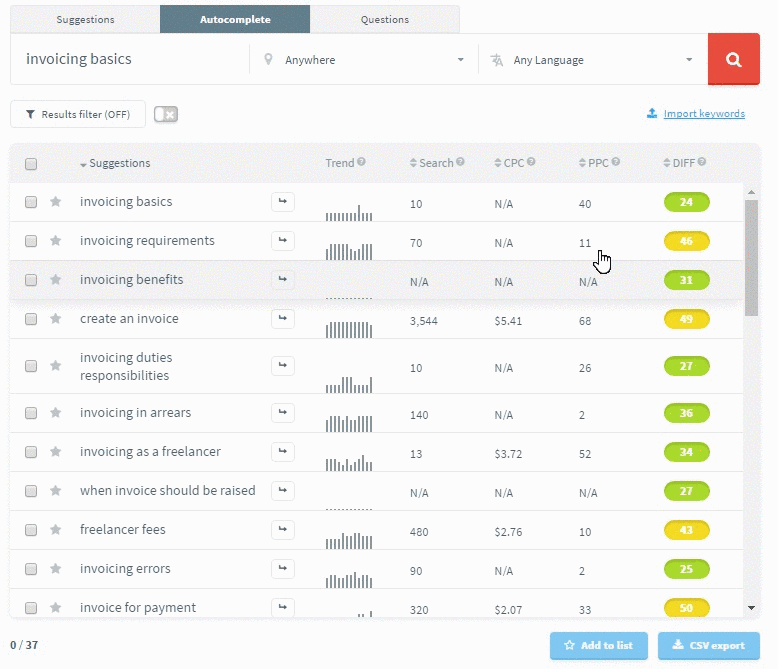
But that's only a fraction of the keywords Invoicely could tackle. Since they target small business owners and freelancers, we can write content related to those topics too.
So I did a search for "freelance clients" and got some pretty good results. Don't worry, I'll show you the full list of keywords I picked from everything a little later.
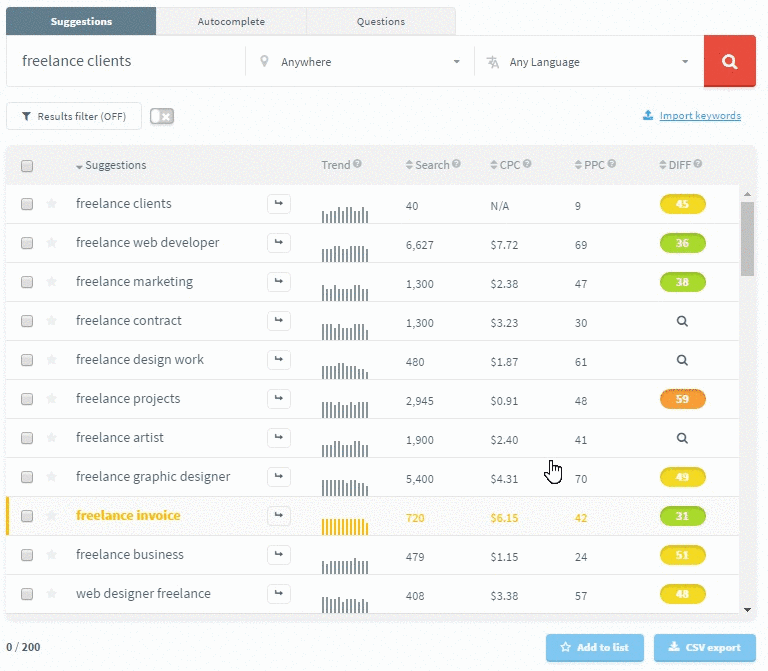
I think you get the picture for what this keyword research process is like.
Basically, think or some seed keywords your audience cares about, then enter them in KWFinder to get new keyword suggestions. Try all three of the search features: suggestions, autocomplete and questions. They all give you plenty of keyword ideas.
One of my biggest suggestions is to use the SERPchecker data in KWFinder. All you have to do is click on any of the keywords in your results, and you'll see the sites currently ranking for any keyword you select. It'll give you an idea of what type of content is ranking at the top. The part outlined in green below.
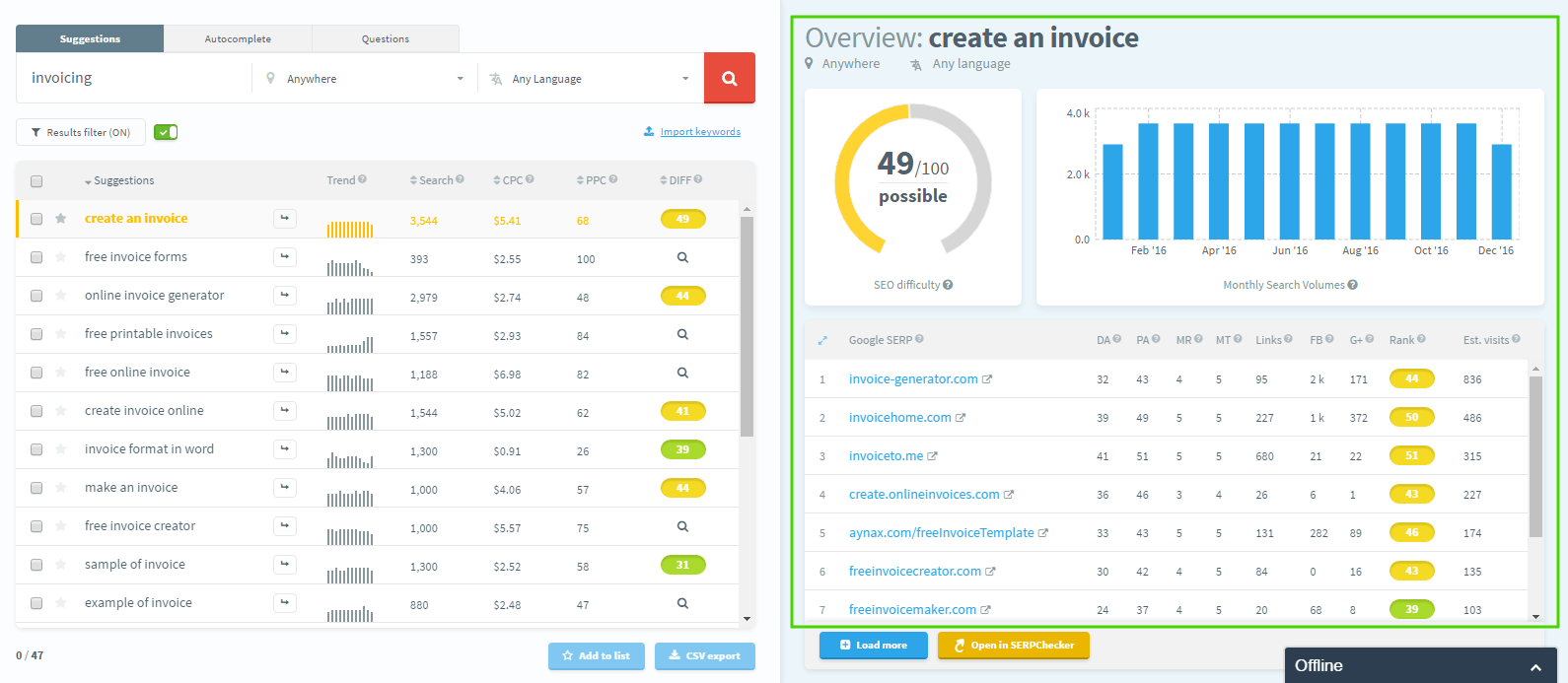
This is really important because while doing keyword research for Invoicely, there were some keywords that seemed good but the SERP (search engine results page) showed it probably wasn't the best target for a blog post. Or, you might think a certain keyword wouldn't be a good fit but it actually is.
For instance, one of the keywords I found was "freelance writing opportunities." I figured the top ranking pages would be sites like Freelancer.com and other job boards. But KWFinder proved me wrong.
Five of the top 10 ranking pages are blog posts, which means there's potential for Invoicely to rank an article.
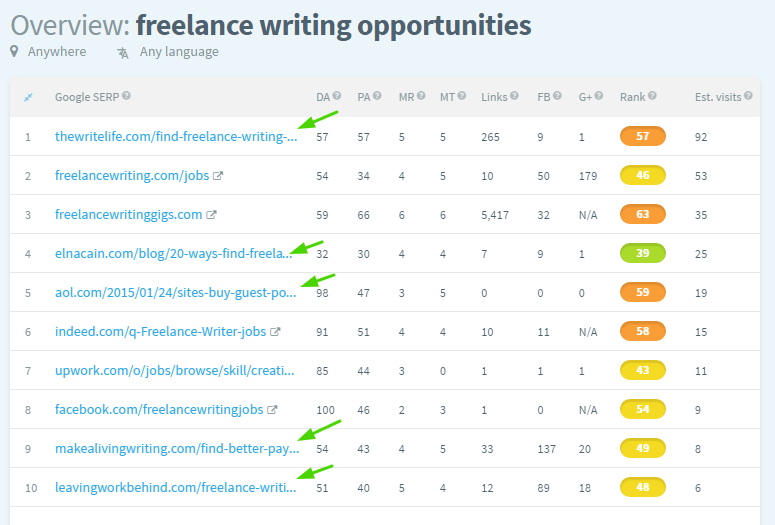
There are tons of other potential keywords they could target. But for the purposes of this guide, I only need enough keywords to create content for a month. So I have more than enough.
Blog Topics for Invoicely
The content plan I'm putting together is just for one month, with three posts a week. Assuming four weeks in a month, that's a total of 12 posts.
Since Invoicely doesn't currently have a blog on their site, I want to prioritize "invoice" related posts. It'll help build the site's overall relevance for searches related to invoicing.
When you first start a blog, try to keep your topics as closely related to your industry/niche as possible. Over time when you've built up a lot of content directly related to that industry, you can start expanding out a bit.
Here are the blog topics outlined for the first month.
Keyword | Topic |
|---|---|
WEEK 1 | |
how to write an invoice | How to Write an Invoice (Templates Included) |
outstanding invoice | How to Collect Outstanding Invoice |
invoiceberry | Invoiceberry vs. Invoicely: The Best Invoice Tool |
WEEK 2 | |
invoice layout | The Perfect Invoice Layout (Infographic) |
invoice approval workflow | 10 Tips to Streamline Your Invoice Approval Workflow |
best freelance websites | 10 Best Freelance Websites to Find High Paying Jobs |
WEEK 3 | |
invoicing for freelancers | Ultimate Guide to Invoicing for Freelancers |
invoice due date | Invoice Due Date Explained (Net 30, Due on Receipt & More) |
freelance writing opportunities | 10 Simple Tips to Find Freelance Writing Opportunities |
WEEK 4 | |
invoicing details | Invoicing Details: 5 Things Your Invoices Need to Include |
invoice for payment | When Should You Send an Invoice for Payment? |
expense tracking apps | Top 10 Expense Tracking Apps for Freelancers |
These topics are strictly based around SEO and keyword research. However, your entire blog doesn't have to center around keywords.
Another Approach to Blog Topics
I recommend writing about interesting topics, not just keywords. One of the best examples of this in action is Quicksprout.
If you look at Neil's posts, you'll notice some of them don't necessarily have a target keyword.

There are a few key benefits of taking this approach. First, it's more indicative of the way people actually search. Most of us use long-tail queries in Google. And the more specific a search is, the closer the person is to making a purchase for the most part. Consider someone searching "iphone 7" vs. someone searching "where to buy the iPhone 7." Which one do you think is further along in the buying process?
Secondly, you shouldn't be relying solely on Google for your traffic. It's perfectly fine and normal for Google to be your biggest traffic source. But you should also promote your content through email outreach, social media and referrals.
In order to do that, you need to write about topics people want to read about, not just keywords.
There are a few tools that can help you come up with these types of content ideas:
- Buzzsumo: Great for seeing blog posts that have been highly shared on social media.
- ContentIdeator: You can get content ideas that aren't necessarily keyword focused, but are great for your readers.
- SumoMe Headline Generator: If you suck at coming up with good headlines/blog titles, these templates can give you a lot of inspiration.
I used these different tools for Invoicely, and came up with some more good topics that don't necessarily have a target keyword. But they have potential to pull in viewers from long-tail searches, social media and other content promotion streams.
- 10 Ways to Invoice Quicker
- How to Make Invoicing Easier on Your Clients
- 5 Reasons Clients Aren't Paying Your Invoices On Time
- 7 Invoicing Tips for New Startups
- 10 Reasons to Stop Sending Paper Invoices Right Now
- Hourly vs. Flat Rate: How Should Freelancers Charge Clients?
- 10 Reasons Not to Use Word Invoice Templates
And there you have it. An example of how I'd do keyword research for Invoicely, plus plenty of blog topics for them write about.
I'd love to get your feedback on this new series. What do you think I could add to make them better?
If you'd like to see this become a regular series on my site let me know. I'll gladly make more of them, and continue tweaking to make sure they're valuable. Lastly, make sure you check out Invoicely, it really is an awesome tool. They just need to get a blog up 
Until next time, keep hustling.
The post Keyword Research & Blog Plan for Invoicely appeared first on dominique.